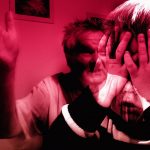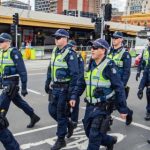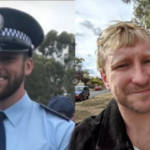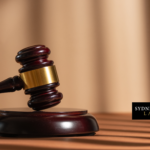Sovereign Citizens: The Real Terrorist Threat?
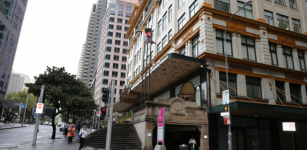
73-year-old John Wilson does not look like your stereotypical terrorist. Hunched and with the remains of his white hair flying from the sides of his head, the former dentist is a regular fixture outside NSW courts. Spouting his hyperbole about being a Sovereign Citizen, he appears to be a harmless eccentric. But to NSW Counter Terrorism and Special Tactics, Mr Wilson is one of more than 300 anti-government extremists who pose a nationwide terrorism threat.
Mr Wilson vehemently denies being a danger to anybody, even though he threw a bag of yellow liquid over a Supreme Court Judge in 1997, and has spent time in prison “unlawfully” for contempt of court. “A terrorist generates fear” he says indignantly, “that is not what I am doing. I am trying to educate people that in a democracy they rule, they have sovereignty.”
John Wilson has been at war with the State for 20 years. He stopped paying tax 15 years ago after being evicted from his house for refusing to acknowledge the mortgage. “I will agree to pay tax voluntarily when I am compensated for being unlawfully put in prison by a judge only” he said defiantly.
He has been to court more than 200 times, starting with a case he brought about banks committing fraud by having variable interest rates.
Since then he has become a colourful and entertaining figure in the courts, disrupting proceedings and protesting outside that all judicial powers are tyrannical, and that courts cannot exercise their authority without a jury. “You must have the judgment of your equals to put you in prison or dispossess you.”
Sovereign citizens say they are not bound by statute law unless they contractually agree to be so bound. Government acts are optional and can only be used on individuals who agree to them. They argue that statutes are “maritime law”, never meant for dry land as they were laws made for ships that were outside jurisdiction on the high seas. They believe that they can declare themselves independent of the government and the rule of law, the only “true” law is their own interpretation of common law.
Mr Wilson say that “the word sovereign means the ultimate authority to make and impose laws. That applies to you. If you’re a sovereign person, you make the laws for yourself.” This, he believes, means sovereign citizens are not obliged to pay taxes or fines, parking fees or have driver licences. According to police, such people can become violent when they are required to act within the rules of the system.
Although Wilson has now run of money, he has managed to form the Common Law Party.
History & Violence
Sovereign Citizens, or “Freemen of the Land”, was a far right movement that begin in the US in 1969, rejecting any authority higher than the local sheriff as “unconstitutional.”
The movement ignited thousands of disenfranchised members of US society, and is still alive and well today. In fact, the FBI has now rated Sovereign Citizens as the world’s top terror threat, ahead of Islamic extremists, responsible for crimes ranging from tax evasion to murder and terrorism. Homeland security says that Sovereign Citizens have also murdered 32 police officers.
In the infamous 1987 Canadian court case Meads v Meads, Alberta Queens Bench Associate Chief Justice John D Rooke described the techniques used by the ‘Freemen’ in court as “frivolous and vexatious”, coining the term ‘Organised Pseudolegal
Commercial Arguments’ (OPCA).
Closer to Home
In Australia, the movement has been embraced by Indigenous communities; a natural fit for people who have never accepted sovereignty.
Former fisherman Mark McMurtrie has been a leading Aboriginal Freeman, travelling the country with message of an Original Sovereign Tribal Foundation. “Our tribes are sovereign” he tells cheering indigenous people at rallies,
“The legislation is entirely immaterial to us. We don’t give two shits what the crown thinks. We are not particularly concerned about their legislation other than the fact that they continue to use their blue coated bully boys to railroad us and to commit ethnic cleansing on behalf of this thing called crown corporation.”
Armed with his own treaties, he is telling dispossessed people what they want to hear,
“Not one piece of legislation of the crown has any authority over any person. If a court is going to exercise any of the powers attaching a right of ownership over me, forcing me to accept any right of punishment over me, then I will be addressing the matter from a point of view of slavery. They do not own me, they have no right to tell me anything.”
In 2002, McMurtie lost a case against the Aboriginal and Torres Straight Islander Commission who he sued for $33 million after losing out on a business grant worth $35,000.
In other unsuccessful cases, he has demanded to have cases of Indigenous persons heard by a Tribal Council of Elders or under Common Law with a jury.
The Guardian has reported that many Aboriginal people have renounced their Australian citizenship, proclaiming their return to tribal law. The best known is Murrumu Walubara Yidindji, a former television journalist who quit his job, returned his passport, medicare card and driver licence, and walked away from his superannuation to “quit Australia” and live by the law of his own tribe.
The Attraction
Sovereign Citizens is a movement that suits a variety of combustible outsiders; from men’s rights activists to groups like Truthology, who hold seminars on how to operate outside of the ATO.
Mark Darwin, who runs Truthology, explains how the “world monetary system impacts your daily life. Everything you thought you knew about money, taxes, fines is one of the greatest illusions ever perpetuated by mankind.”
The Truthology website offers to free people from wage slavery so they can enjoy their lives by getting around fines of all kinds using the Sovereign Citizen tactics.
The site makes it all sound quite palpable. Perhaps we all question why we slog to work every day, frustrated about how our lives are ruled by mortgages, wages and a plethora of rules. We wonder whether we are prisoners of system that is beyond our control, and long for a better and easier way to live in the world.
But the problem with not paying your electricity bills is that sooner rather than later, the lights will be turned off

